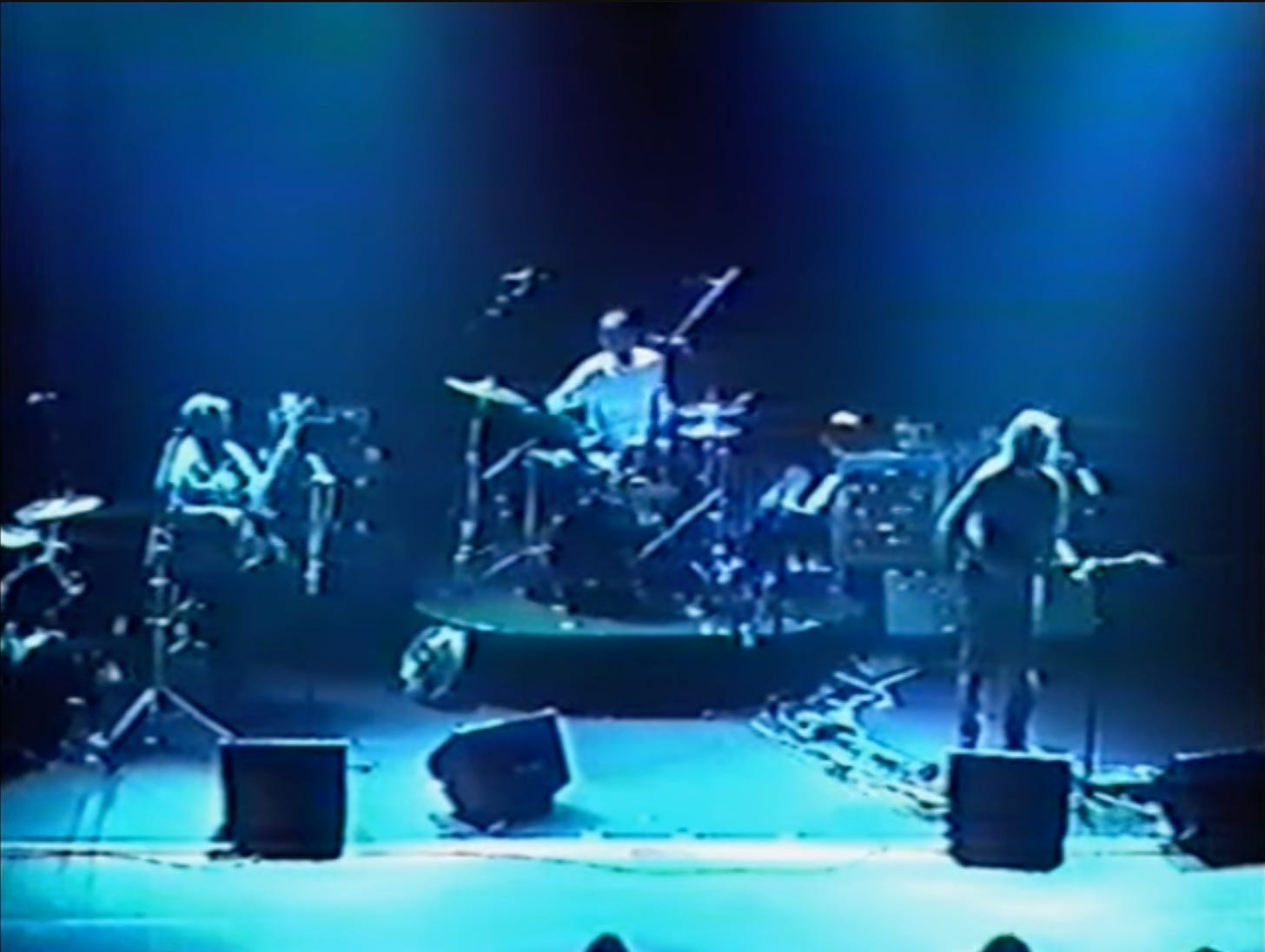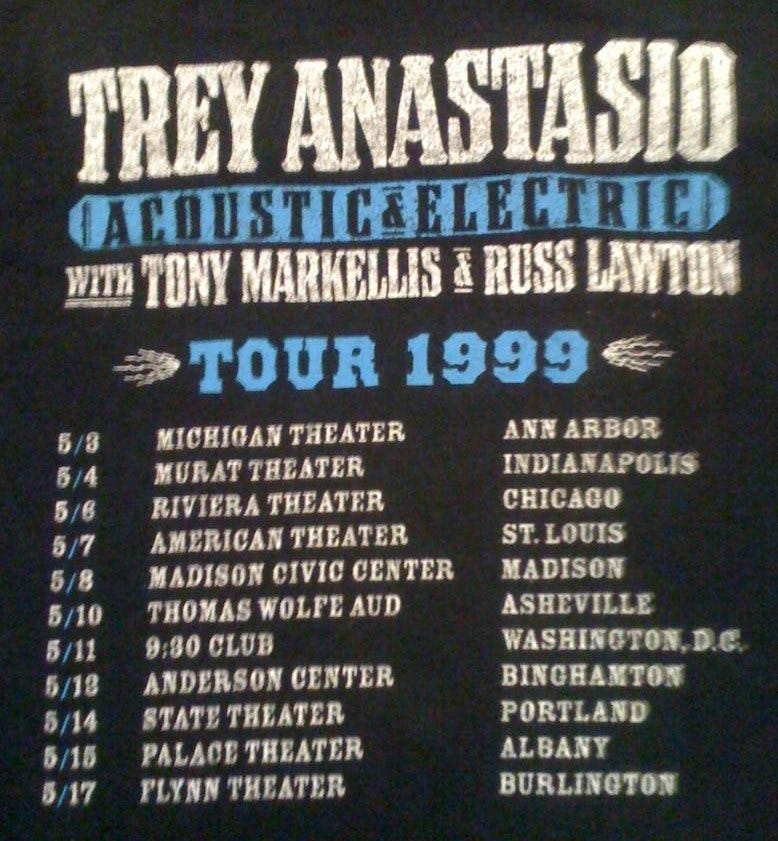MOST PLAYED SONGS: O-o-h Child (12), First Tube (12), Sand (12), Drums (11), Gotta Jibboo (10), Will It Go Round in Circles (10), Heavy Things (10), I Can See Clearly Now (9), Aqui Como Alla (8), Voodoo Child (8)
For the first time in my life, I have a co-worker who is on the same level of unhealthy Phish fandom as I am. So not the usual “oh yeah, I saw them a couple times in college” work friend, but a true “OK what’s your ticket request game plan” 15 minutes after the tour announcement peer. But just the other day, I freaked her out when she asked if I was going to see TAB and I revealed that I had no interest – and didn’t even realize they were in town.
I’m fully aware that this complete lack of enthusiasm for solo Trey a half-hour drive from home is a strange stance, given that I already have two vacations planned around Phish in 2024. Despite ample opportunities, I’ve seen him in solo mode only twice: that very first non-Vermont show in Ann Arbor and once at the Riviera in 2010, when I was relapsing hard into Phish obsession. Sitting out the Wilderness Years helped, as I never felt desperate to scratch that itch during the break-up. And with the real thing touring consistently, why settle for Diet Phish?
That’s a cruel label, but the ever more convergent threads of Trey’s main and side gig beg the comparison. In that TAB show I blew off earlier this month, he played a dozen songs he normally plays with Phish, and the proportion will be even higher if any of the new debuts make the expected crossover later this year. And the familiar material didn’t get the solo acoustic treatment, they were all played by a four-piece electric lineup exactly mirroring the instrumental lineup of Phish. To quote a song I’m going to mention a whole lot this year…what’s the use?
It didn’t seem that way in 1999, at least in the moment. Trey hit the solo road with a deep shelf of new material; in addition to the six debuts in the acoustic sets, he added six more to the electric set, plus several songs that had never been heard outside of Higher Ground. Of the 27 songs performed in TAB electric sets, only one had been performed by Phish at the time, and the answer is a great stumper for your next Phish trivia night*. By the end of 1999, that exclusivity would disappear – First Tube, Sand, Jibboo, Bug, and Heavy Things would all become main-band staples, and some of the covers would bleed over as well.
But at least in May, Trey treated TAB like its own separate thing. And it was an opportunity for him to experiment with a band built from scratch, creating something distinct from the egalitarian four-headed monster that Phish had evolved into. The covers that Trey chose for the tour tip his hand as to what he was looking for: it’s heavy on the Hendrix, with four different songs – one seventh of the band’s repertoire – written or performed by the guitarist in his Experience era.
In theory, the Jimi Hendrix Experience was a band, but nobody was mistaken about who was first among equals. Noel Redding and Mitch Mitchell were recruited by Hendrix for their rhythm and blues chops (and cool clothes), and they understood their mission – stay out of the way and provide a stable foundation while the frontman unleashes his talent and reinvents the electric guitar. Only after the Experience dissolved did Hendrix try a more Phish-like collaboration with Band of Gypsys; it only lasted five shows.
When it came to recruiting his alternative to Phish, Trey went the opposite direction. Instead of looking for an alternative set of active collaborators, he went for a different power balance with Tony Markellis and Russ Lawton, road dogs from assorted Burlington blues and afrobeat bands. On the Alive Again podcast in 2021, Trey lays out what made him so excited about playing with this duo:
“Those guys had an ability to get so locked in…like the groove was locked,” Trey said. “They're kind of like a freight train leaving the station when it comes to the groove. It's so heavy, it's the heaviest groove.”
Loads of musicianship goes into establishing that groove, but once it’s there, it’s “locked,” like the runoff ring of original copies of Sgt. Pepper. Tony and Russ are listed as co-writers on First Tube, Sand and Gotta Jibboo, but Trey describes that songwriting process on the podcast as essentially “you guys play something cyclical and I’ll write over it.” And that’s how this trio approaches their live show as well, producing an infinite-loop backdrop that enables Trey to dive deep into his pedals or solo until his fingers fall off, no pesky key changes or competing melodic ideas to get in the way.
It’s not an inferior way to make music – it’s how most bands do it! – but it’s very different from Phish, where even if Trey and Tom brought in most of the songs, each member of the band played a part in breathing them into life in the studio and on stage. TAB, by contrast, is more like Trey making demos at home; recording himself playing the drums and bass parts himself, then singing and soloing over the top. Tony and Russ are almost automatons – very, very skilled automatons, but programmed for a specific, unchanging task nonetheless.
That approach is so different from the context we’re accustomed to that it’s fascinating…for a while. It worked quite well for the 8 Foot Fluorescent Tubes one-off, and I certainly enjoyed my single dip into this tour at the time. But stretched out over a dozen shows with a limited repertoire, it gets a little tiresome. I confess; I did not listen to every note of every show on this tour, just dabbled here and there, and I don’t think I missed much. The stasis of these early TAB compositions repeats on a longer time scale – the trio and its songs sound pretty much the same at the end of the tour as they did at the start.
The exception is Sand, though it doesn’t so much evolve as stretch, going from 15 minutes at the start of the tour to touching 23-25 by the end. On Alive Again, Trey also describes his trio as “hypnotic, almost like trance music or electronica” and while that’s a stretch when they’re playing (ugh) “Bell Bottom Blues,” you can definitely hear it with Sand, which takes the Remain in Light tutelage to an envelope-pushing extreme. The unchanging groove starts doing weird things to a listener’s mind, and Trey is in his happy place spinning up multiple loops and making his guitar moan digital whalesong – it’s no shocker that he’d continue that exercise for even longer periods of time with Phish later in the year.
Elsewhere, he fills out the set with a selection of covers that don’t offer much fresh insight on what makes Trey tick. There’s all the Hendrix I mentioned earlier, plus “Will It Go Round in Circles,” a Billy Preston song given a “what if Hendrix had played it” hypothetical. There’s some classic AM soul in “O-o-h Child,” “Then Came You,” and “I Can See Clearly Now” – all an awkward fit for the group’s leaden backing vocals, though the Five Stairsteps’ classic provides some of the tour’s most compelling jams. Marc Ribot’s A Love Supreme tribute “Aqui Como Alla” is a better change of pace and “Come On Baby Let’s Go Downtown” smartly draws from another great backing band whose strength is found in lumbering thunder.
Trey also, amusingly, builds in segments to hop around instruments like he’s Prince, doing weird, blippy synthesizer solos at a few shows (foreshadowing another divisive 1999 Phish element) and playing interminable drum duets with Russ at all but one. Solo tours are always going to flirt dangerously with self-indulgence, and these are the moments where it froths over; we already know Trey is a good drummer, we don’t really need 12 minutes of evidence each night.
And it’s that touch of ego that leaves me with an uneasy feeling about this tour, knowing with hindsight how the year will unfold. Trey living out his Hendrix-style frontman fantasies on a side tour is one thing, but it doesn’t take long for the lines between his two projects to blur.
A month after TAB ends, Phish will come back with a new stage setup, with Trey setting up his own zone stage left – the same place he stood on the solo tour – instead of standing embedded within his bandmates. Songs written with and for the TAB trio become Phish songs, despite the very different approaches of the non-Trey individuals in both bands. The ultimate Phish aspiration to merge into a collective conduit for pure music…well, it seems a little cloudier after this tour. And in addition to my ambivalence about what the project has grown into today, that’s a seed planted in this early stage of TAB that I’ve never quite gotten over.
* - Of all things, it’s…“Smells Like Teen Spirit.”







Yeah, I’m also baffled by what purpose the most recent iteration of TAB serves. Was never the hugest fan of the ‘99 tour, but man do I love the ‘01-03 era. And probably not coincidentally, at that point it was in a completely separately lane than the one Phish resided in.
Re: the trivia question, Phish also played “Come On (Part 1)” on 4/29/87 and more famously during the 11/27/98 Worcester soundcheck that circulates in SBD (also released as an iTunes bonus track for Live Phish 06).
(And, if I wanted to get even more pedantic and ACKCHYUALLY about it, I’d point out they’ve also played “Drums”.)
The lack of TAB exclusive songs is so strange. I had a good enough time when I saw them a few years ago, it’s hard to understand the point of it. It’s not even like the arrangements are much, if at all, different.